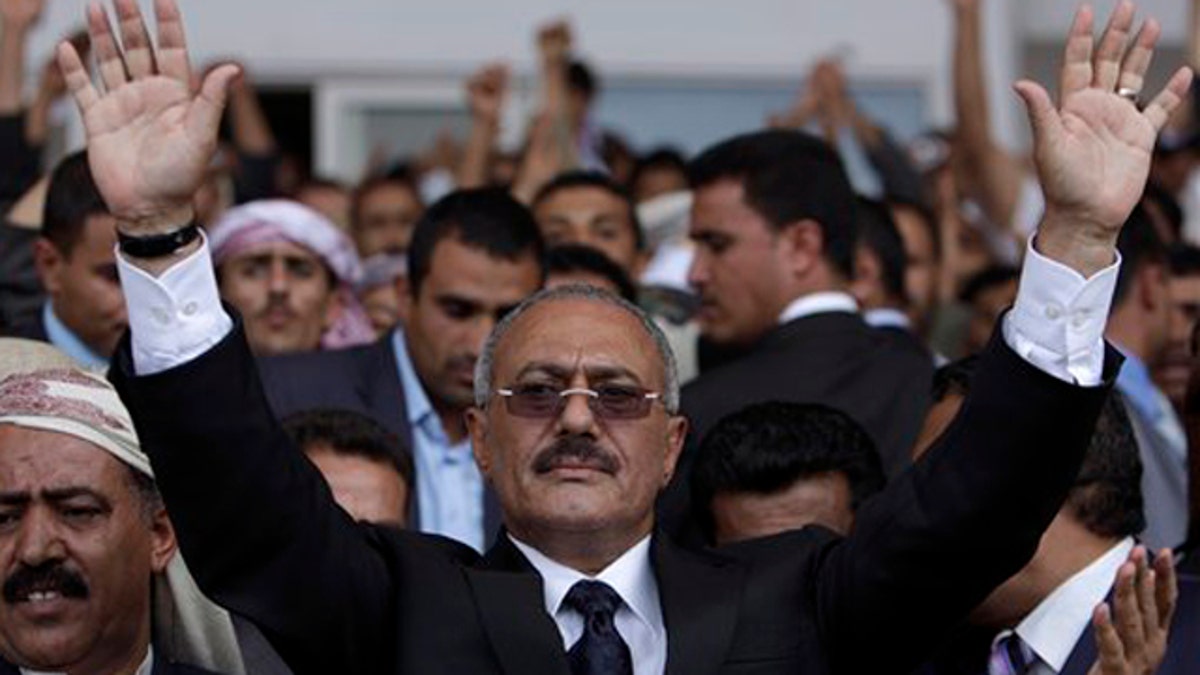
FILE - In this April 15, 2011 file photo, Yemeni President Ali Abdullah Saleh waves to his supporters, not pictured, during a rally in Sanaa,Yemen. (AP)
Yemeni President Ali Abdullah Saleh has left a hospital in Saudi Arabia more than two months after being severely wounded in an attack on his palace compound in Sanaa, Yemen's state news agency said Sunday.
A Yemeni government official said that Saleh, who was badly burned in the June 3 blast, has officially asked Saudi authorities to return to Yemen, accompanied by a medical team. Saleh's request appears to have been turned down at least temporarily, the official said.
Saleh was discharged from the hospital in the Saudi capital of Riyadh and moved to a government residence in the city to further recuperate, Yemen's official SABA news agency said.
Another Yemeni government official said the ailing president will remain in Riyadh for the time being because he is "still under medical supervision,"
"We don't know yet when he will return to the country, but soon God willing," the official said.
Both government officials spoke on condition of anonymity because they are not authorized to brief the press.
Saleh's more than two-month absence has only added to the uncertainty and instability in Yemen, the Arab world's poorest country. There are fears his return could throw an already unstable Yemen into further chaos.
The anti-government protest show no signs of abating, and the economy lies in tatters. Islamist militants -- some believed to have links to al-Qaida -- have also seized upon the growing chaos to take over entire towns in the south.
The country's politics, meanwhile, have been in a state of near paralysis. Vice President Abed Rabo Mansour Hadi is nominally in charge in Saleh's absence. But the real power on the ground appears to be Saleh's son, who controls some of the country's best trained military forces, and the powerful Hashid tribal confederation, which opposes the regime.
Government troops and Hashid fighters clashed last week in Sanaa, and remain locked in a tense standoff. In late May, the two fought pitched street battles in the capital that threatened to escalate into a full-scale war.
Saleh's continued stay in Riyadh, despite checking out of the hospital, appeared to indicate the intense pressure he is under from his Saudi hosts as well as the Americans to relinquish power.
Riyadh, long one of Saleh's top allies, is now among those pressing him to give up power.
Anxious about the unrest on its southern doorstep, Saudi Arabia was among a group of six nations in the Gulf seeking to persuade Saleh to step down in return for immunity from prosecution. The U.S. also backed the deal.
Saleh three times agreed to the plan, only to back out at the last minute. The attack on his palace came days after he pulled out of the deal for the third time.
Mansour al-Hayel, a political analyst in Sanaa, said "the ball now is in the court of Saudi Arabia and U.S."
"Saleh will play games and will insist on returning but the Saudis and the Americans are the ones who can convince Saleh to remain in Riyadh and transfer power," he said.
Yemen's foreign minister, Abu Bakr al-Qirbi, who visited Saleh on Saturday, warned of the "explosive status quo" and said that a political solution, not a military one, is needed to end the crisis.
He called for a dialogue between the regime and opposition parties. Previous efforts at dialogue have collapsed.
Opposition spokesman Mohammed al-Sabri dismissed the idea.
"We are not holding talks with the ruling regime, only after Saleh signs the deal," he said.
In his first and only public appearance since the attack, Saleh said last month that he'd undergone eight operations since the attack. His prolonged absence from the public eye fueled speculation about the severity of his wounds and whether they would prevent him from returning to Yemen.
The stunning June 3 attack killed 11 bodyguards and seriously wounded five senior officials worshipping alongside Saleh in the presidential palace's mosque. The government first blamed the blast on anti-government tribal fighters, and then said al-Qaida was responsible.
On Sunday, SABA quoted an unidentified security official as saying an investigation is under way to pin down those behind the "terrorist attack" on Saleh's compound. Results of investigation will be announced publicly and suspects will be prosecuted in public trials, the official said.
